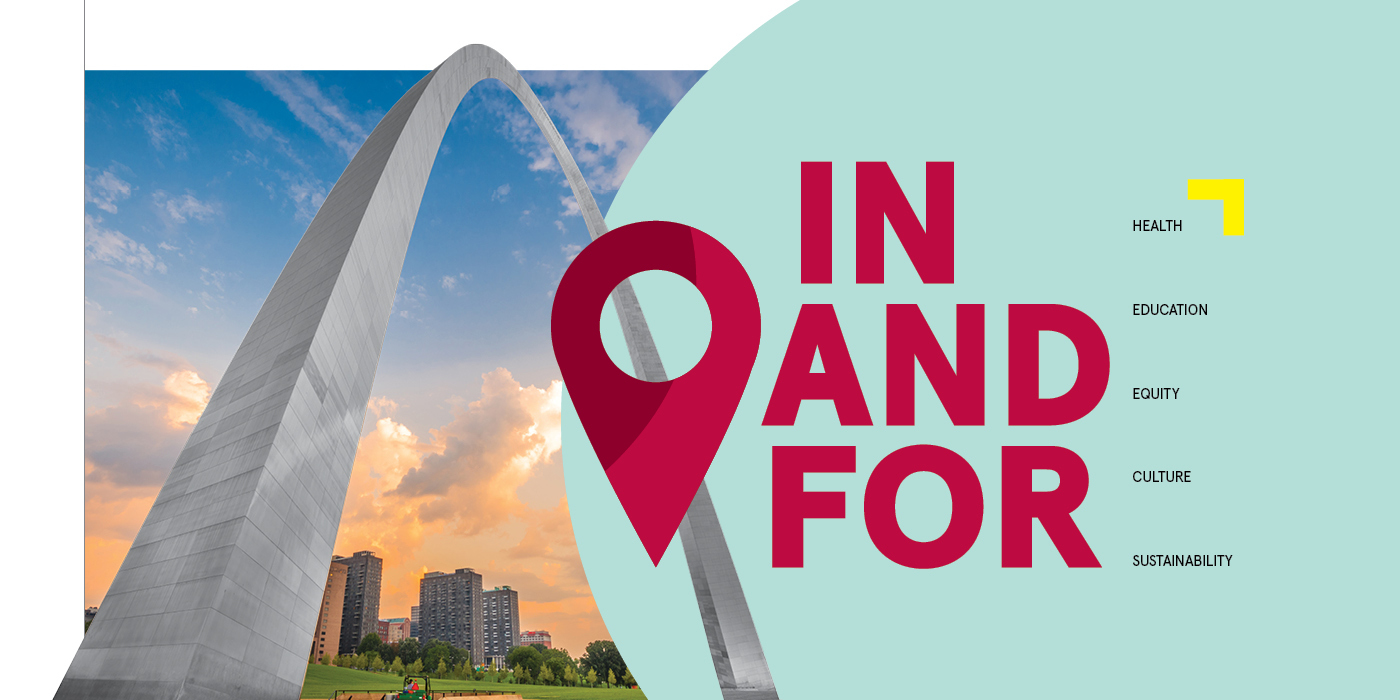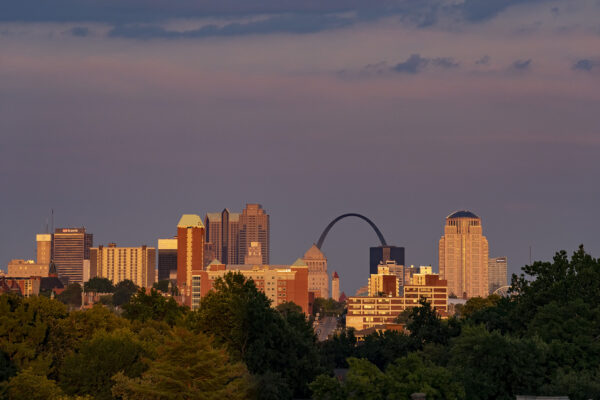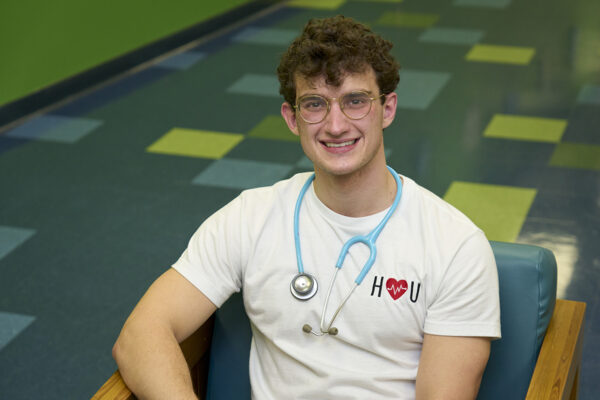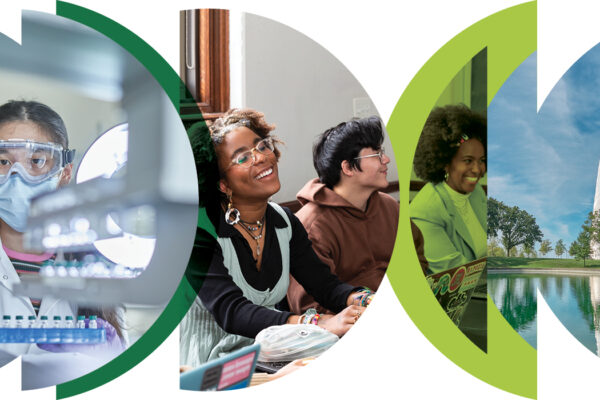Washington University and St. Louis go back a long time, exactly 170 years since the founding of the university in 1853. Today, the institution and the region are working more closely than ever on transformative solutions to societal challenges and partnering for the growth of every person in our community.
In the following vignettes, you’ll learn about a sampling of our faculty, students, staff and alumni who are collaborating with local organizations for the betterment of the region and beyond. These partnerships and others have already had a great impact, yet WashU is making a broader commitment — through the “Here and Next” strategic plan — to position the university, as Chancellor Andrew Martin says, “in St. Louis, for St. Louis and with St. Louis.”
“Chancellor Martin and I know that we can always do more,” says Lisa Weingarth, WashU’s senior advisor for St. Louis initiatives. “We have the talent and the resources here, and in growing these partnerships, and creating new ones, we can help bring about profound, positive change in this place we call home.”
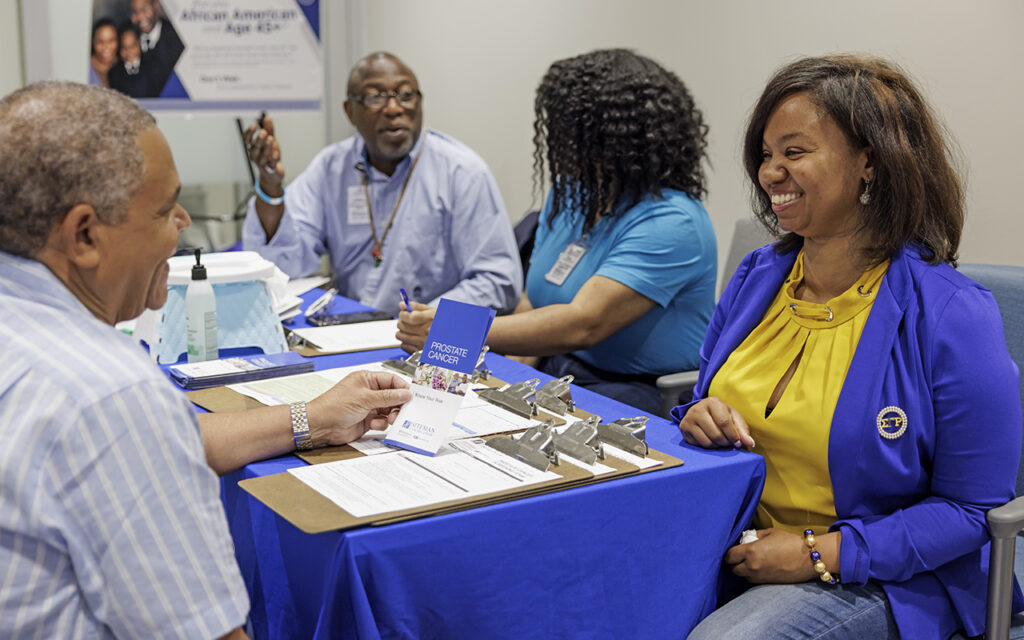
For better health
In St. Louis, Black women are twice as likely to die of breast cancer than white women, and Black men are 60% more likely to have prostate cancer. Bettina Drake, Vetta Sanders Thompson and Carol Camp Yeakey — three experts representing different WashU schools and disciplines — share a common mission to eliminate these disparities through research, education and outreach.
“Health is not just about prevention or cures,” says Yeakey, whose inter‑ disciplinary research focuses on the St. Louis ZIP codes with the highest rates of cancer. In Poverty and Place: Cancer Prevention Among Low-Income Women of Color and Cancer: Charting the Path Forward for Low-Income Women of Color, Yeakey and fellow co-authors, including Thompson, determine that “health is also about cultural factors, economic opportunities, education, environmental factors, psychological and social factors, and more: poverty, race, housing.” Yeakey stresses, “Attempting to address health through a narrow lens will lead to futility.”
Yeakey, Thompson and Drake agree that strong community partnerships are key to improved health outcomes. For instance, Drake and Thompson have joined forces with some 50 nonprofits and agencies through the Program for the Elimination of Cancer Disparities’ (PECaD) Breast Cancer Community Partnership. Together, they increased visits to the Siteman Cancer Center mammography van, hosted health fairs at local churches and supported a network of lay cancer navigators. The result: The diagnosis of late-stage breast cancer among Black women in the region decreased by a whopping 40% in the past decade.
PECaD also has worked with community partners to eliminate barriers to screening and treatment of prostate cancer and has recruited more Black men to participate in medical studies — a critical step to better understanding cancer disparities.
“People really care about each other in this community,” Drake says. “Our job is to be in conversation with these organizations and incorporate their experiences and voices into our work.”
“And to show up,” Thompson adds. “We are not there for just one meeting or to take their data. We show up because we care. It’s about building a deep relationship, not just a partnership on paper. That’s how trust is built and sustained.”

Matthew Kreuter
• Kahn Family Professor of Public Health,
Brown School
• Founder, Health Communication Research Laboratory
• 2023 William H. Danforth St. Louis Confluence Award winner, “Here and Next”
As Washington University physicians fought COVID-19, Matthew Kreuter battled another deadly contagion: COVID-19 misinformation.
Kreuter collaborated with local nonprofits and government agencies to build trust in the vaccines and reach St. Louisans who historically have been failed by the medical establishment. The team created the nation’s first local surveillance and response system to identify and address misinformation, recruited “vaccine ambassadors” to share their experiences with the unvaccinated, and developed a testing and vaccination program for homebound seniors. In addition, the team established a COVID research information hub where St. Louisans could learn about COVID studies and participate in important research.
“We were able to get accurate information into the hands of trusted local messengers,” Kreuter says. “We illustrated a new way that academic research centers like ours can work with community partners to address urgent needs of the community in a faster and more rigorous way.”
Daniel Mamah, MD
• Professor of Psychiatry, School of Medicine
• Founder and Director, Washington Early Recognition Center
About 3% of the population will experience a psychotic episode in their lifetimes. And yet many people suffer for years from psychotic disorders without a clear diagnosis or effective interventions. That’s why Daniel Mamah, MD, started the Washington Early Recognition Center, an outpatient clinic that serves patients between the ages of 13 and 25 who are at risk or have a psychotic disorder such as schizophrenia. The free clinic employs a team of licensed counselors, social workers and psychiatric physicians who offer a range of services, including psychiatry, individual and group psychotherapy, case management, community outreach, cognitive training, and behavioral and cognitive assessments.
“Imagine you’re a mother or father, and suddenly you’re seeing this happening to your child, but there’s nothing you can do to control it. It’s heartbreaking,” Mamah says. “We know effective treatment means more than seeing a psychiatrist or getting a counselor. So we work with families and patients, spending as much time as needed to help them get their lives back on track.”
John Jachimiak, Arts & Sciences Class of ’24
• President, Heart for the Unhoused
Led by John Jachimiak, Heart for the Unhoused’s 100 student volunteers partner with local nonprofits to create hygiene kits and provide informational resources and basics like food and toiletries at shelters across the city.
“These kits and supplies allow us to connect with these individuals and help guide them to other available resources in the area,” Jachimiak says. “And we’re here to listen.”
Anneliese Stoever, MSW ’03
• Director, St. Louis Area Agency on Aging
Anneliese Stoever first started working with St. Louis’ older adults nearly two decades ago as a practicum student at the Brown School. Today, she leads efforts to advocate on behalf of older adults in the city, connecting them with services, expanding their access to food through the Meals on Wheels program and lunch programs at senior centers, increasing their exercise options to improve health and wellness, and more.
“If your focus is health, mental health or advocacy, inevitably you will be working with older adults, and they deserve exceptional services,” Stoever says.
Kelly Harris
• Assistant Professor of Occupational Therapy & Surgery (Public Health Sciences), School of Medicine
• Director, Health Equity, Opportunity and Education Laboratory
Childhood asthma impacts more than physical health; it also hurts academic participation and performance. In 2019, Kelly Harris discovered that north St. Louis neighborhoods experience environmental injustice and suffer higher rates of asthma. Now, she is studying how occupational therapists can assess home and school environments to reduce asthma triggers.
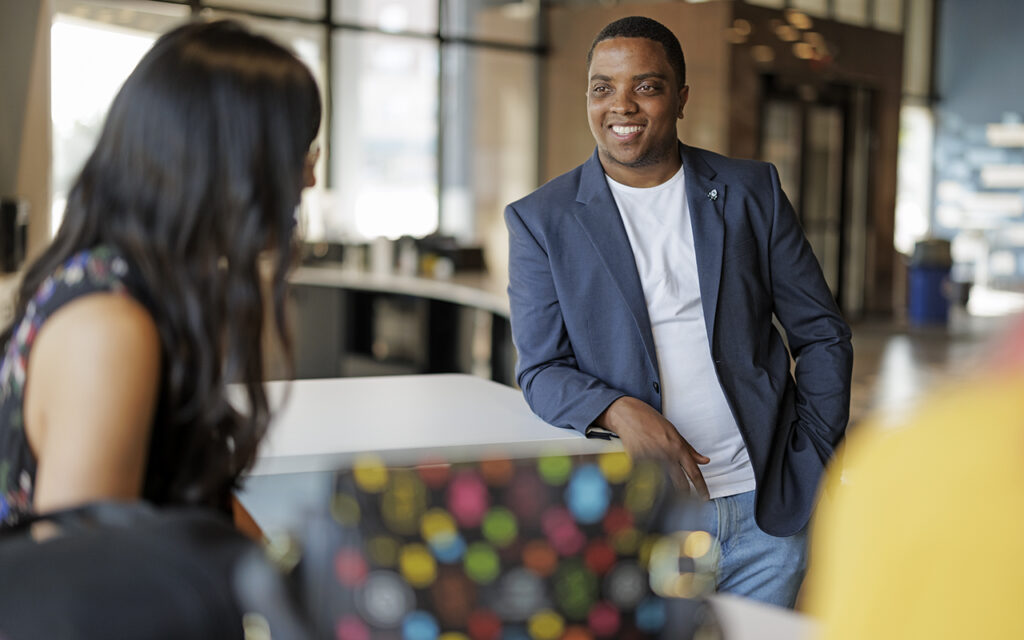
For better education outcomes
Julian Nicks, BSBA ’13
• Chief Executive Officer, LaunchCode
University City native and WashU alum Julian Nicks first learned of LaunchCode as a graduate student at Stanford. He was familiar with coding boot camps — nearby San Francisco had dozens. But LaunchCode was different. First, its courses are free. That’s a big deal for LaunchCode learners, many of whom do not have a degree or make a living wage. Second, LaunchCode places job-ready graduates in paid apprenticeships with some 500 businesses across the St. Louis, Kansas City and Philadelphia regions. About 80% of those apprenticeships end with a job offer and on average more than double the graduate’s previous salary.
“From the start, LaunchCode was making an impact — for the students who wanted more for their families and their careers, and for the businesses that needed tech talent,” Nicks says.
Nicks joined the LaunchCode board in 2020 and was appointed CEO this year, after 10 years in the private sector at management consulting firm Bain & Company. Founded by fellow WashU alum and Square co-founder Jim McKelvey, AB ’87, BSCS ’87, LaunchCode serves around 1,500 learners and job-seekers annually and focuses on serving those often shut out of the tech industry, including hosting special cohorts for women+, veterans and incarcerated learners.
“The decision to lead LaunchCode was a mixture of my love for St. Louis and my passion for social impact,” Nicks says. “You don’t need a long education to learn coding. If you have foundational math and logic skills, aptitude and the drive to learn, you can code.”
As CEO, Nicks hopes to take the LaunchCode model to other regions and build new partnerships here. For instance, WashU’s School of Continuing & Professional Studies now accepts LaunchCode credits for its data science degrees.
“St. Louis needs more people trained in these skill sets to meet labor market demand,” Nicks says. “Every day, we are working to meet that challenge.”

Nikki Doughty, MSW ’14
• Associate Director of Strategic Initiatives, Institute for School Partnership*
Want a thriving community? Invite all students to experience joyful learning and support educators to lead, innovate and inspire.
Nikki Doughty does just that, partnering with Institute for School Partnership (ISP) staff and educators across the St. Louis region through a variety of innovative ISP initiatives such as STEMpact District Immersion and Teacher Quality (TQ); the Transformational Leadership Initiative; Math314; and mySci, a standards-aligned, kit-based curriculum that makes hands-on science learning possible. Each year, ISP reaches 3,850+ educators and 189,000+ pre-K–12 students from 50+ school districts and 60+ independent schools.
“Our teachers need resources, coaching, evaluation and professional development — and that’s where ISP can move the needle,” Doughty says. “It’s exciting to see teachers create learning environments that move student achievement beyond surviving toward thriving.”
*In 2023, the institute was designated a “Here and Next” Provost Investment in Research-to-Practice Network.
Andrew Butler
• Chair and Associate Professor of Education, Arts & Sciences
• Associate Professor of Psychological and Brain Sciences, Arts & Sciences
• Co-Chair, St. Louis School Research-Practice Collaborative
What is the St. Louis School Research-Practice Collaborative (SRPC)? “A lot of research-practice partnerships consist of one university working with a single district. We wanted to take a more comprehensive, inclusive and regional approach. Our collaborative includes researchers from WashU, Harris-Stowe State University, University of Missouri–St. Louis, Saint Louis University and other institutions working with practitioners at St. Louis Public Schools, KIPP St. Louis and Confluence Academies.”
What is the SRPC studying? “Our practitioner partners have identified student mobility (when students move from school to school during the academic year) as a major barrier to our children’s academic growth and well-being. When students move between schools, it can create challenges for not only the student who is moving, but also those who remain in schools with high mobility rates, teachers who are now tasked to integrate the student and ensure they are meeting the student’s academic needs, and the larger school community. Our initial report found that student mobility rates are substantially higher in our city schools than in the surrounding counties and other comparable cities.”
What’s next? “To address student mobility, we need to understand why students move and where they are going. With that data, schools can put policies and interventions in place to help students and teachers.”
Daniel Keating
• Tyrrell Williams Professor of Law, School of Law
Daniel Keating is committed to serving the students of Maplewood-Richmond Heights High School. For the past eight years, he has taught a nine-week ACT prep course, and for many years, he served on the board of Joe’s Place, a shelter for the district’s unhoused teenage boys.
Tashanna Stanciel
• Director, College Prep Program
Growing up in St. Louis, Tashanna Stanciel would have loved to join a cohort like the College Prep Program, WashU’s innovative effort to help talented, first-generation and limited-income high school students get to and through college. Now, she serves as the program’s director, introducing participants to campus resources, helping them navigate the college application process and showing them that they can thrive in college — just like she did.
Katie Auyeung, McKelvey Engineering Class of ’26
• President, Studio Tesla
Every week, Studio Tesla members travel to local middle schools to lead hands-on activities, including extracting DNA from a strawberry, building a bridge from straws and constructing a birdseed holder.
“Studio Tesla stands for teaching engineering to St. Louis adolescents, but it’s so much more than engineering. It’s sustainability, it’s biology, it’s physics,” says Katie Auyeung, a sophomore at the McKelvey School of Engineering. “The best part is seeing the students light up when they start to solve a problem. I remember that feeling when I was in middle school and want to share that spark with others.”
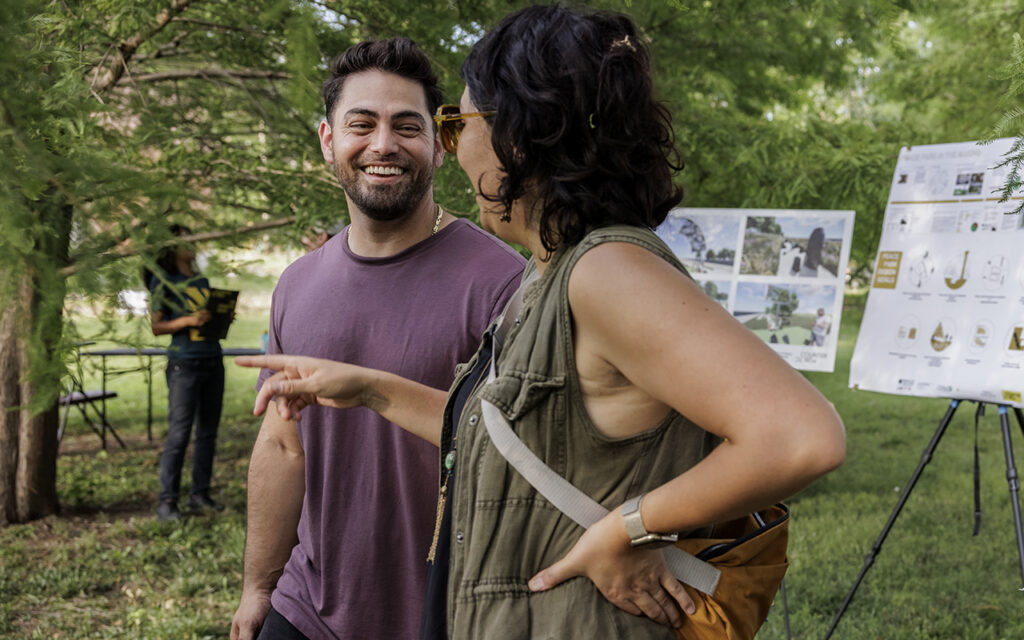
Partnerships for equity
Matthew Bernstine, MUD ’14
• Associate Director, Office for Socially Engaged Practice, Sam Fox School of Design & Visual Arts
• Lecturer, Master of Urban Design
Broken pavers catch the sun. Worn foundations peak through the grass. A brick path still marks the alley between now-demolished properties.
In College Hill, the ground is layered with history.
But last summer, on a sloping, 1.5-acre parcel known as Peace Park, new layers were taking shape. Small flags, marking utility rights-of-way, sprouted like dandelions. Spray-painted lines delineated a future orchard, an amphitheater, an exercise circuit, a playground, a rain garden.
“Residents told us they want this to be a beautiful place,” says Matthew Bernstine, associate director of the Office for Socially Engaged Practice (OSEP). “They want a place that’s healthy. They want a place —Peace Park — to demonstrate their pride in their neighborhood.”
Set on a bluff overlooking the Mississippi River, College Hill is home to Bissell Mansion, St. Louis’ oldest surviving residence. The Grand Avenue Water Tower, built in 1869 and still the world’s tallest freestanding Corinthian column, parts traffic like a stone in a stream. But the 20th century brought hard times. Today, College Hill has some of the city’s highest vacancy rates.
Peace Park dates to the late 1990s. After his home was destroyed by lightning, local activist Otis Woodard (1936–2015), a former associate of Martin Luther King Jr., took to dispensing food and clothing from a concrete table on what had been his own front lawn. A grassroots resource was born.
In 2014, Jason Purnell, associate professor in the Brown School and president of the James S. McDonnell Foundation, released a report about regional health disparities. Soon, Purnell’s Health Equity Works and the Grace Hill Settlement House (now the Urban League), engaging with College Hill residents, identified upgrades to Peace Park as a neighborhood priority. More than a dozen local organizations and the City of St. Louis are now aiding the effort.
In 2019, Bernstine — who serves as WashU representative to the core Peace Park planning group — and OSEP outreach coordinator Emily Coffman led a Sam Fox School seminar to brainstorm design strategies. “The charge to students was to think about the entry plaza,” Bernstine recalls. “We also worked with residents to develop an overview aesthetics of the park. What would residents like to see and do in Peace Park?”
Bernstine’s seminar also helped to inform a 2022 studio, led by Wyly Brown, assistant professor, in which students designed, proposed and constructed a bamboo entry pavilion that will be installed at the park’s southwest corner. Meanwhile, Arbolope Studio, the celebrated landscape architecture firm led by L. Irene Compadre, AB ’08, MLA ’12, a visiting assistant professor, completed the final site plan. Penina Acayo Laker, assistant professor, is developing wayfinding and graphics.
“This is an incredibly meaningful, community-led project,” Bernstine says, noting that construction and planting should be completed by the spring. “I’m proud of all the people and institutions that have rallied behind it.” —Liam Otten, BFA ’93

Nicole Cortes, JD ’12, MSW ’12; Jessica Mayo, JD ’12
• Co-Founders, Migrant and Immigration Community Action Project
Since its founding a decade ago, the Migrant and Immigrant Community Action (MICA) Project has provided legal representation to some 4,600 immigrants and refugees from 65 countries. But working with clients to obtain legal status is only part of the mission.
“From the start, we wanted to take a more holistic approach, addressing the whole person,” Cortes says. “We collaborate with other community organizations to provide pathways through the complex systems our clients face.”
The MICA Project recently moved to Cherokee Street, a vibrant home to many immigrant businesses and families.
“Immigrants contribute so much to our community. Our region is fortunate that immigrants chose to build a life here,” Cortes says.
And that’s not the only reason Cortes and Mayo do this work.
“Whether they are fleeing danger, reuniting with family or seeking better opportunities, everyone has the right to go through these established legal pathways,” Mayo says. “Everyone has human dignity.”
Sean Joe
• Benjamin E. Youngdahl Professor of Social Development, Brown School
• Founding Director, Race and Opportunity Lab
What is HomeGrown STL*? “HomeGrown STL is a community science initiative of the Race and Opportunity Lab to improve the lives of Black boys and young men in a way that is measurable and large scale. After years of planning, people from across the region are stepping up in a manner that poises us for impact.”
What innovations offer promise? “One innovation is our life coaching program, which is composed of dedicated professionals who connect Black males to the region’s network of housing, education, health and youth development organizations. Another innovation, the St. Louis Community Information Exchange, is helping health and social service providers better deliver coordinated care. A nonprofit system that has the same level of data infrastructure as the health-care system will be so much more efficient and effective, not only for HomeGrown, but the entire region. I’m also really excited about our workgroups, incubators for possible solutions, like our skills-to-jobs workgroup that is answering how to prepare young Black males with the skills needed to employ them in summer or livable-wage jobs.”
Why is it so important to focus specifically on Black boys and young men? “Right now, Black men and boys don’t believe in the systems. They want to be successful economically, but they don’t see the region offering the opportunity framework to do so. Here’s a parallel: Our generous community has created a welcoming environment to facilitate the economic integration of immigrant and refugee populations. These males want the same thing. And so should everyone, because if you improve the economic outcomes of Black men at scale, you improve the outcomes of everyone in the region.”
*Earlier this year, Sean Joe was selected as a 2023 Confluence Award Top 10 finalist, and HomeGrown STL was designated a “Here and Next” Provost Investment in Research-to-Practice Network.
Karen Tokarz
• Charles Nagel Professor of Public Interest Law & Policy, School of Law
• Co-Founder and President, St. Louis Mediation Project
• Director, Civil Rights & Community Justice Clinic
No one benefits from an eviction — not the tenants, not the landlords and certainly not the community. To promote housing stability, Karen Tokarz launched the St. Louis Mediation Project, in conjunction with her Civil Rights & Community Justice Clinic, in which law students and volunteer mediators have helped resolve thousands of St. Louis City and St. Louis County housing disputes over the past decade through free, confidential counseling and mediation services.
Molly Metzger
• Senior Lecturer, Brown School
• Faculty Director, Center for Social Development
Chris Krehmeyer, AB ’86
• President and Chief Executive Officer, Beyond Housing
Janeka Haden, MSW ’23
• Policy Associate, Office of the President of the St. Louis Board of Aldermen
Molly Metzger and Chris Krehmeyer are two of the region’s leading advocates for safe, affordable housing. Metzger and her students recently published “Welcome Home: A Policy Briefing Book for Housing Opportunity in St. Louis County,” offering strategies to make the inner-ring suburbs of south and central St. Louis County more equitable and affordable.
Janeka Haden, one of Metzger’s former students and a co-author of the “Welcome Home” report, reflects on the historical context of St. Louis’ housing challenges: “On the journey to meaningful solutions, we must remain aware of the cumulative decisions that have brought us to this juncture. Any remedy that fails to place equity and the most marginalized at its core merely perpetuates the illusion of justice.”
Meanwhile, Krehmeyer’s community development organization Beyond Housing continues to bring economic investment, affordable housing and much-needed services to the 24:1 Community, which includes the 24 north St. Louis County municipalities within the Normandy Schools Collaborative.
“Families and communities have many needs that must be met in order to thrive, including housing, employment, education, health, economic development and municipal government,” Krehmeyer says.
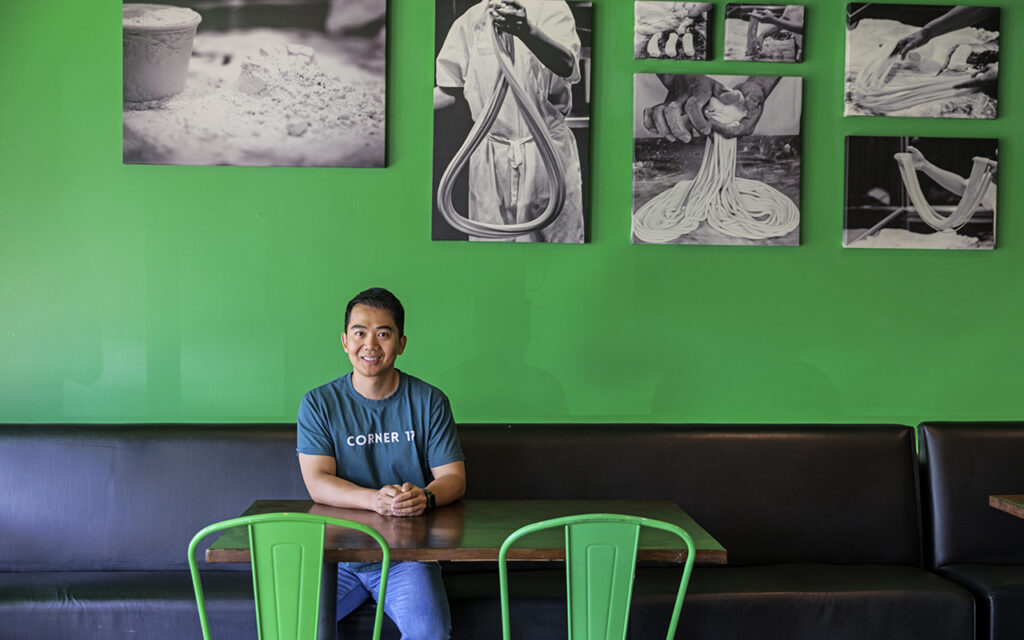
For enhanced culture
Xin Wei, EMBA ’21
• Founder, Wei’s Hospitality Group
Restaurateur Xin Wei can’t make noodles, steam bao buns or stuff dumplings. But he can read the tea leaves.
In 2015, Wei moved to triple the size of the fledgling family business, Corner 17. Wei’s parents had doubts: The hospitality business is tough, and they had already lost one restaurant. But Wei knew demand for his parents’ traditional recipes and boba teas would surge as the region’s Asian population grew and local diners became more adventurous.
He was right. Today, diners flock to Corner 17 for its hand-pulled noodles made from scratch by Wei’s parents behind a large glass window. Wei calls the spectacle “the noodle show.”
“Food is never just food,” says Wei, whose favorite dishes are the pork buns and the wonton with chili oil. “From the start, we wanted people to see how we make noodles in China and to understand a culinary culture that goes back thousands of years.”
The name Corner 17 evokes both Wei’s hopes for the future and his ties to the past. Wei wants to be on every corner and, indeed, the family business is expanding. Wei operates W Karaoke Lounge, which offers private rooms for small groups, a first in St. Louis. And Corner 17 just opened a location in Olin Library’s Whisper Café, serving boba tea, bao buns, dumplings and grab-and-go dishes.
The number 17 represents Wei’s age when his family moved from rural China to Belleville, Illinois. There, the family worked at a Chinese buffet, saving money to open their own restaurant in Alabama. When that venture failed, they returned to the region and started all over again.
“My parents always say, ‘Always remember where you came from, no matter where you are now,” Wei says. “Seventeen was a turning point in my life. I came here, didn’t know English and started from zero. I never want to forget that.”

Adam Presswood, BS ’18
• Oral Historian, Soldiers Memorial Military Museum
Next time you go downtown to Union Station or a Cardinals game, visit the Soldiers Memorial Military Museum. The immensely interesting, but often-overlooked, museum shares American military history through the lens of St. Louis.
“It is a treasure,” Adam Presswood says of the 85-year-old institution. “The study of war has become somewhat unfashionable, but to understand who we are, you need to understand our conflicts.”
In his current role, Presswood records Vietnam veterans sharing their memories of basic training, combat, coming home and adjusting to civilian life. Their accounts are part of the museum’s permanent collection and are on view in the exhibit Vietnam: At home and at war through May 27, 2024.
“It’s easy to think of wars as these events that happen far away to another group of people,” Presswood says. “This place reminds us that these events may have been bigger than us, bigger than St. Louis, but they were still shaped by our local people.”
Michael Allen
• Senior Lecturer, Architecture, Landscape Architecture and Urban Design, Sam Fox
School of Design & Visual Arts
• Lecturer, American Culture Studies, Arts & Sciences
Whether researching the infamous Pruitt-Igoe housing complex, leading a walking tour of the Central West End or salvaging terra-cotta façades for the National Building Arts Center, Michael Allen is committed to preserving, documenting and sharing St. Louis’ extraordinary architecture.
Most recently, Allen curated the expansive exhibit Urban Archaeology: Lost Buildings of St. Louis, on view through Feb. 4, 2024, at the Pulitzer Arts Foundation. The exhibit brings together salvaged architectural elements from landmark buildings, residential homes and neighborhood institutions to highlight innovations in materials, design and construction, as well as explore the complicated legacies of power, wealth and neglect that have shaped St. Louis.
Mary Strauss, MA ’69
• Partner, Fox Associates
In saving the beloved Fox Theatre in 1982, Mary Strauss did no less than spark the rebirth of Midtown, now home to lively museums, theaters, hotels and restaurants. This year, the Missouri Arts Council honored Strauss for her support of seminal arts organizations such as COCA, Saint Louis Ballet, Saint Louis Art Museum, The Muny and Opera Theatre of Saint Louis.
Sophie Lin, Arts & Sciences Class of ’26
WashU Pride Alumni Network Fellow, Gephardt Institute for Civic and Community Engagement
Sophie Lin was not dismayed after studying St. Louis’ long history of bigotry and inequality. She was inspired. “I see it as a positive that people here are having the hard conversations and want to make the city better,” Lin says.
So, Lin joined the Gephardt Institute’s St. Louis Fellows Program, which immerses fellows in the city’s culture and politics and funds full-time internships at local nonprofits. Lin worked at PROMO, an LGBTQ advocacy group, as well as Camp Indigo Point, a camp for queer youth.
“At the end, we ask campers to share their experiences. Their answers were beautiful: ‘I can be myself here,’ ‘I feel safe,’ ‘I am accepted for who I am,’” Lin says. “I’m glad I was able to help create this space for queer joy.”
Michael Dorf, AB ’84, BSBA ’84
• Founder and Chief Executive Officer, City Winery
Debuting in March, the intimate City Winery is bringing top artists — and great wines — to St. Louis audiences. Founder Michael Dorf, who opened his first City Winery location in New York 15 years ago, says St. Louis is a city on the move.
“I’d been watching St. Louis,” Dorf told the St. Louis Post-Dispatch. “There are new buildings, investments happening, proud locals doing the work.”
Non-Euclidean Geometry
Students Spencer Kates, Henry Windish, Gabe Hamburg, Maeve McFadden and Evan Quigley are Non-Euclidean Geometry, a high-energy indie act that fans call a “Gen Z Steely Dan.” Promoting its debut album, Into the Midnight, the band is attracting crowds across the region.
Greg Gleicher, BSBA ’13
• Founder, Good Developments Group
Greg Gleicher is spearheading the Gateway South Innovation District, a billion-dollar development project envisioned as a hub for the design and construction industries. The 94-acre project will also bring housing, shops, attractions and green spaces to that area of downtown.
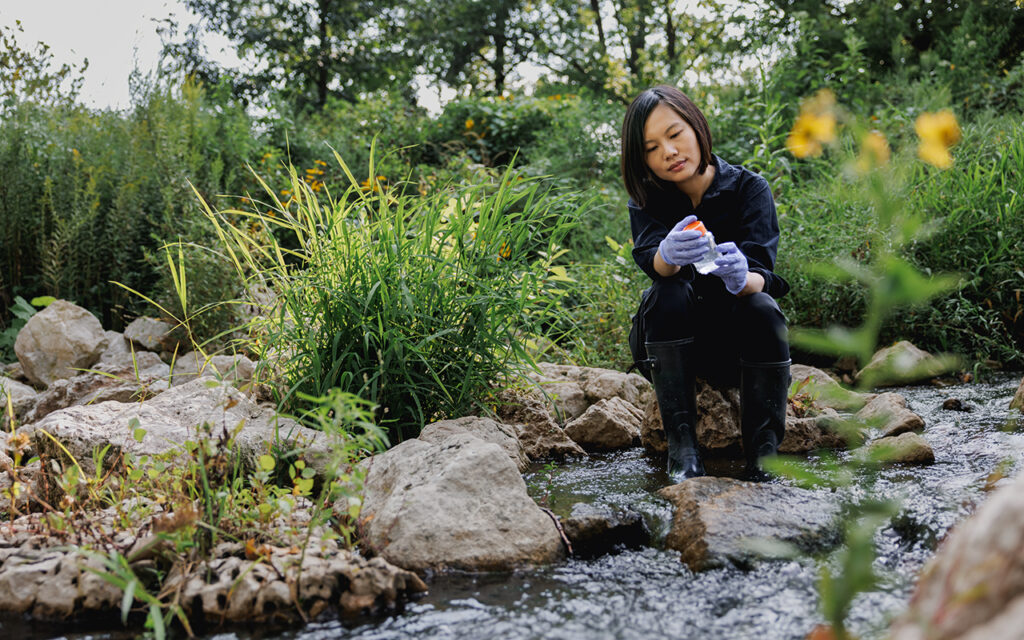
For the region’s sustainability
Fangqiong Ling
• Assistant Professor, Department of Energy, Environmental and Chemical Engineering, McKelvey School of Engineering
As a high schooler in Beijing, Fangqiong Ling studied water invertebrates with scientists from a nearby university. Today, Ling leads a program that does the same for St. Louis youth.
In an educational initiative called “OurH2hOme” through the Institute for School Partnership, Ling and her doctoral students connected with local high school teachers and students to embed the study of microorganisms in St. Louis household water samples into the curriculum.
“When I came to St. Louis in 2018, seeing the interesting neighborhoods and historical buildings got me curious about the microbial life in the buildings and in the water,” Ling says. “To address that question, we needed to work with the people of St. Louis.”
Notably, Ling’s award-winning research extends across disciplines from discovering new ways to analyze wastewater samples to monitoring box turtles with Saint Louis Zoo staff. The latter she conducts to better understand the wildlife microbiome and the ways in which it is impacted by biodiversity loss.
Across the field of environmental engineering, community service remains a key component, Ling says. “It’s through the dialogues that scientists hold with educators that we learn how to write accessible educational materials and research protocols for citizen-scientists.
“My students know their work is touching real people, and I can see the excitement on their faces when they work on these projects,” she says.

Tyler Cargill
• Doctoral Student, McKelvey School of Engineering
As a member of the research group led by Jay Turner, the James McKelvey Professor of Engineering Education, Tyler Cargill uses his passion for engineering, community engagement and the environment to study St. Louis air quality. In 2022, he helped install air quality sensors at 14 churches across the region for AirWatch, a community-based partnership among the Turner Group, the university’s environmental studies program, the Nature Conservancy and Metropolitan Congregations United, a faith-based organization committed to environmental justice.
“We inhale the particles. If they’re small enough, they can spread to anywhere in your body, and that can lead to an increased risk of inflammation and cause cardiovascular effects,” Cargill explains. “That’s why we do air quality research.”
Cargill also met regularly with community members to explain the data collected and hear their experiences.
“It’s important to realize the target audience for your research. For air quality specifically, people must always come first,” Cargill says. “Our job as air quality researchers is to understand the perspectives of the community and create dialogue such that knowledge is transferred both ways.”
Phil Valko, AB ’03
• Assistant Vice Chancellor for Sustainability
Phil Valko is advancing sustainability initiatives both on and off campus. As co-chair of a St. Louis regional energy and emissions working group and co-founder of the Midwest Climate Collaborative, Valko is helping to develop strategies and capture data that will accelerate the region’s efforts to achieve net zero emissions by 2050.
Washington University already has significantly reduced emissions, thanks to Valko’s leadership. WashU also is now one of the state’s largest producers of on-site solar energy, home to 30+ LEED-certified buildings and a major investor in programs that conserve water, promote low-carbon transportation and reduce waste. In addition, Valko teaches an interdisciplinary environmental studies capstone course where students serve as consultants to a local community, proposing solar and decarbonization strategies.
“We’re all hurtling through space together on a changing planet, and it’s deeply professionally and personally meaningful to collaborate to advance solutions that are only possible by working together,” Valko says.
Aamna Anwer
• Sustainability Coordinator, Office of Sustainability
In addition to her work at the Office of Sustainability, Aamna Anwer leads the environmental efforts of the Islamic Foundation of Greater St. Louis. Initiatives include the introduction of a composting program to eliminate food waste during the month of Ramadan and a ban on plastic water bottles at one of the largest mosques in the region.
Nadav Sprague, AB ’17, MPH ’20
• Founding Chief Executive Officer and President, Gateway to the Great Outdoors
In a mission to make the outdoors more accessible, Gateway to the Great Outdoors (GGO) provides environmental and STEAM education to low-income public schools throughout St. Louis and Chicago through weekly classroom lessons, monthly outdoor adventures, overnight camping trips and year-round mentorships to empower students to learn and experience local ecosystems.
In the 2022–23 school year, GGO was named the St. Louis Public School District’s (SLPS) Community Partner of the year. “I am very proud of our amazing partnership with SLPS,” Sprague says. “SLPS has been very supportive of our mission. A lot of our students have never seen a lake or a forest before our program. We expose them to things they learn in school but are often not able to conceptualize.”
Tova Feinberg, MBA ’22, and Dave Kanoff, MBA ’22
• Co-Founders, VertiGreens
Vertical farming startup VertiGreens is producing high-quality herbs and lettuce varietals with no chemicals, minimal water and nominal space. The outfit just started a partnership with James Beard-nominated chef Ben Poremba at his restaurant Olio.
“Tova and I are both passionate about food — where it comes from, the flavors and, most importantly, how food brings people together to build community,” Dave Kanoff says.
“Combining our shared mission to create a more healthy and knowledgeable community around food has proven to be an excellent foundation for our startup venture.”
